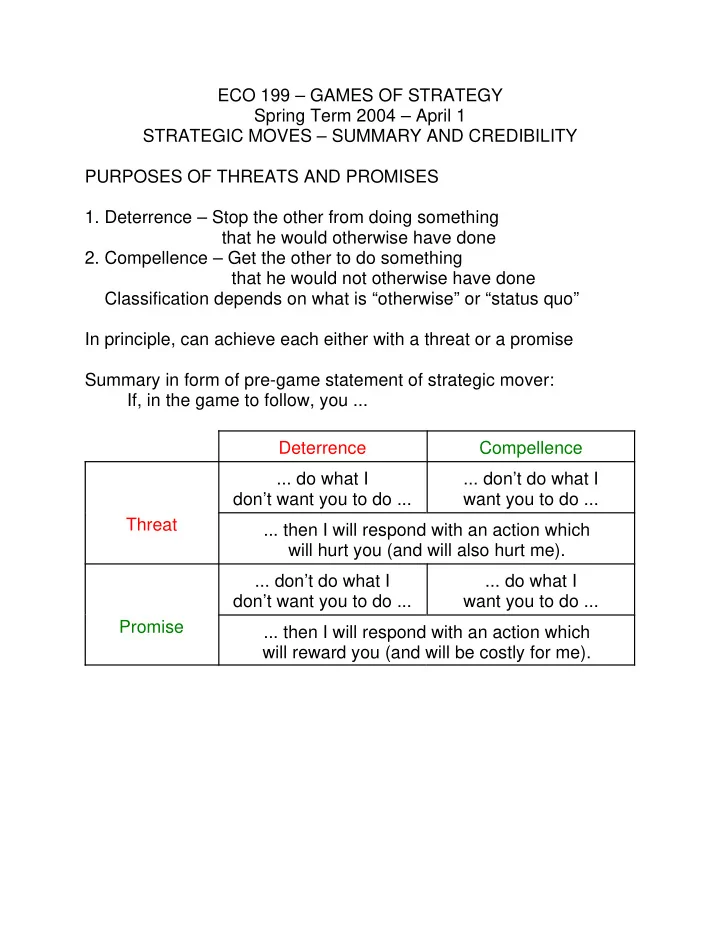

ECO 199 – GAMES OF STRATEGY Spring Term 2004 – April 1 STRATEGIC MOVES – SUMMARY AND CREDIBILITY PURPOSES OF THREATS AND PROMISES 1. Deterrence – Stop the other from doing something that he would otherwise have done 2. Compellence – Get the other to do something that he would not otherwise have done Classification depends on what is “otherwise” or “status quo” In principle, can achieve each either with a threat or a promise Summary in form of pre-game statement of strategic mover: If, in the game to follow, you ... Deterrence Compellence ... do what I ... don’t do what I don’t want you to do ... want you to do ... Threat ... then I will respond with an action which will hurt you (and will also hurt me). ... don’t do what I ... do what I don’t want you to do ... want you to do ... Promise ... then I will respond with an action which will reward you (and will be costly for me).
FURTHER POINTS ON THREATS AND PROMISES Difference Between Deterrence and Compellence: Deterrence need not have a deadline; you merely stand ready to implement your threat, initiative up to other But compellence needs a deadline, otherwise the other player can defeat your purpose by procrastination or partial fulfillment. So a better method for compellence is to use a promise relative to a new or changed status quo Start the mutually harmful action, and promise to stop when the other player complies, creating incentive to comply quickly and fully Difference Between Threat and Promise: If your promise succeeds in achieving its purpose, you must deliver on it, and this is costly to you So you don’t want to promise more than is needed get other player to comply This is a natural upper bound on size of a promise But if threat is successful, you don’t have to carry out the threatened action, so its actual cost is irrelevant and you can make a huge threat even for small purposes But too costly a threat may be less credible Usually because of possibility of errors: (1) other fails to comply and then you have to act (2) other complies but your action happens anyway More generally, all strategic moves carry risks of this kind Use them at your own responsibility – don’t sue me !
SOME POINTERS TO THE ART OF MAKING STRATEGIC MOVES ENHANCING CREDIBILITY OF YOUR STRATEGIC MOVES (A) Reducing your own future freedom of action 1. Automatic fulfillment – doomsday device, burning bridges 2. Delegation – to someone who has the “correct” payoffs 3. Cutting oneself off from receiving communication (B) Changing your payoffs 1. Reputation – link to payoffs in other or future games 2. Divide into small steps to get repeated-game-like equilibria 3. Teamwork, contracts – use other people’s payoffs 4. Irrationality – pretend to be crazy, fanatical, ... 5. Brinkmanship – create risk but not certainty of mutual harm REDUCING EFFECTIVENESS OF OPPONENT’S THREATS 1. Irrationality – can be “strategically rational” 2. Cutting off receipt of communication 3. Salami tactics – respond to compellent threat by partial response or procrastination deterrent threat by series of small transgressions COUNTERING THE OTHER’S COUNTERMEASURES Against salami tactics – Brinkmanship threat whose risk or severity increases gradually Especially dangerous because the bad outcome can happen while each side waits for the other to concede Brinkmanship can also work against the other two strategies of irrationality and cutting off communication since opponents usually leave a “loophole” in these
Excerpts from Henry V, Act 4, Scene 3 English camp at Agincourt Theme: How to motivate soldiers to fight ... he which hath no stomach to this fight, Let him depart; his passport shall be made And crowns for convoy put into his purse: We would not die in that man's company That fears his fellowship to die with us. [1] In Nash equilibrium with individual action, disgrace in taking up this offer [2] Once a soldier chooses to stay, his payoffs change [3] Clever cheap talk to convince the soldiers that he shares their risk This day is called the feast of Crispian: ... And Crispin Crispian shall ne'er go by, From this day to the ending of the world, But we in it shall be remember'd; We few, we happy few, we band of brothers; For he to-day that sheds his blood with me Shall be my brother; ... ... gentlemen in England now a-bed Shall think themselves accursed they were not here, And hold their manhoods cheap whiles any speaks That fought with us upon Saint Crispin's day Incentive design – non-monetary incentives: [1] Honor in community, esp. contrast with cowards who did not come [2] “Brotherhood” of small units; making virtue of small numbers [3] “Brotherhood” with the king, cheap talk but emotionally powerful Cheap talk of sharing their risk again
Recommend
More recommend